Chris Herren, founder of The Herren Project and Project Purple initiative, spoke at Souderton Area High School on May 30, 2018. The impact of his speech to the student body was profound. The following article is sponsored by friends of Souderton Area High School.
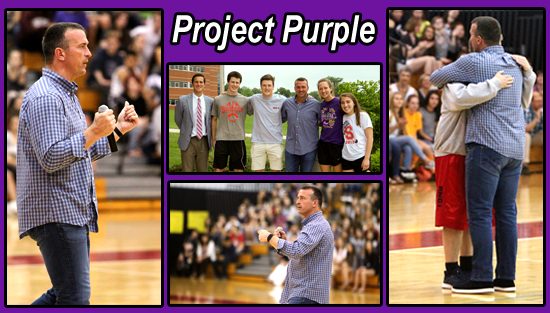
By Mary Jane Souder
FRANCONIA TWP - Souderton’s gymnasium has had its share of raucous crowds in recent months. Creating a lot of the noise was a girls’ basketball team that made history with the program’s first ever District One 6A title run. More recently, the Allen Iverson All-American Classic rocked the house with the nation’s top high school players showcasing their moves to an appreciative full house.
Fast forward to a Wednesday morning in late May.
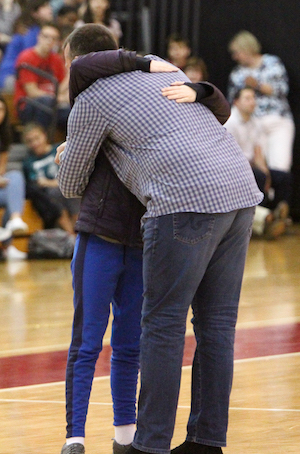 The gym was quiet, impossibly quiet considering that more than 2400 students packed the bleachers to the rafters. A young man stepped up to one of the microphones set up in front of the bleachers and - after briefly thanking former NBA player and recovering drug addict Chris Herren for sharing – said simply, ‘Could I have a hug?’
The gym was quiet, impossibly quiet considering that more than 2400 students packed the bleachers to the rafters. A young man stepped up to one of the microphones set up in front of the bleachers and - after briefly thanking former NBA player and recovering drug addict Chris Herren for sharing – said simply, ‘Could I have a hug?’
Herren and the young man shared an emotional embrace with the roar of applause raining down from every corner of the gym.
The young man made his way back to his seat in the last row of the freshman section as lines began forming at the microphones. One student asked how to advise a friend who was involved in drugs, another spoke of a relative with an addiction issue, still another, whose father was in jail, told of losing his mother to addiction, and one young lady shared her intense grief over a loss suffered.
“It was a lot of emotions,” senior Kate Connolly said. “You could hear a bunch of sniffles, and everyone was crying because you didn’t know and you feel horrible. You feel so bad for these people because you didn’t know they were dealing with all of this.”
It could have gone on for hours, this overwhelming display of honesty and courage, and long lines remained when Herren – who was heading for another presentation at another school – left the gym. All this in response to a message that was not what anyone expected.
Far from it.
“Going into it, I had known Chris Herren’s story and had seen his 30-for-30,” senior Dean DiPisa said. “When he came in and started talking to us, immediately it seemed to me like – ‘Okay, this is going to be something different.’
“Everybody has been through the same old drug addict story. I was taken aback by the perspective he used – it was, I want to say, more relatable to high school students.”
Herren began with a story of a young girl who never felt she belonged, a young girl who cut herself behind closed doors but found her voice and changed her life. Herren still receives monthly e-mails from the young woman.
“A lot of times when you come into a presentation like that – he even said it himself – you don’t really know,” senior Liz O’Hara said. “You think it’s going to be the same old presentation.
“Usually you expect the students to be pretty disengaged, on their phones and not really paying attention. I think with this one, when he started talking, the entire audience was silent and listening to everything he said. I think it’s because he told stories of kids that were the same age as us that were having these huge problems. I think sometimes you feel like you’re in your own little world and that doesn’t really affect you, but it’s happening in our own community.
“When kids got up to the microphone after he spoke and started talking about their own experiences, it really hit home because some of those kids that were up there – you would never know the things that have impacted them. Even the younger kids, I feel like at first they were braver than the upperclassmen because they were the first ones up there to the line. It’s kids you probably would never meet in high school and you see how much of a struggle they’ve gone through. You respect them more for getting up there and standing up there and saying, ‘Yeah, I’ve struggled with this in my family too.’”
*****
Chris Herren’s story is a compelling one, so compelling he is the subject of an ESPN 30 for 30. His is the story of a star basketball player from Fall River, Mass., who had the world at his fingertips with offers from the nation’s top basketball programs. Herren opted to stay close to home and play at Boston College. The downward spiral began almost immediately as he failed a drug test for marijuana and cocaine. A broken wrist in his first game sidelined him the entire season, and more failed drug tests resulted in his expulsion. He had a second chance at Fresno State, and despite more failed drug tests and a stint in a rehab center, he made it to the NBA. By this time, pills and heroin had entered the picture. His stay in the NBA was relatively brief as his addictions won out.
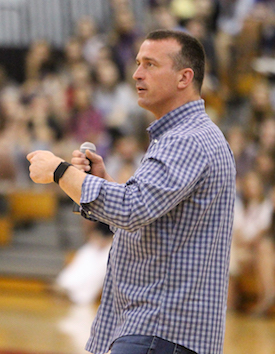 Herren – after completing an extensive rehab program - has been drug and alcohol free since August 1, 2008. It would have been easy for him to simply tell his story, but he had a change of heart.
Herren – after completing an extensive rehab program - has been drug and alcohol free since August 1, 2008. It would have been easy for him to simply tell his story, but he had a change of heart.
“It was my responsibility as the person presenting to put a different spin on it and to really think about the depth of where this begins,” he said. “I’m so, so tired of the doom and gloom method of addiction. Even people in recovery, we fall back to that and how bad it was instead of talking about the origin, where it began.
“When I decided to do it, I was a little nervous about switching my speech, and I was very careful about it. Going in, I knew what I was going to say. Honestly, it would be a lot easier for me emotionally to go in and tell my story. This is a much different, much more emotionally draining way to do it, but it’s far more effective too.
“That’s why I started out with self-harm. There’s this notion – ‘Oh, this jock, this athlete, he’s going to come in and say how bad his life was and he got over it. It doesn’t pertain to me.’ When I started off with the self-harm, it automatically becomes inclusive. It brings in kids that think that this assembly doesn’t pertain to them, the outliers in a sense. The thing for me is you walk into a building and you kind of have to read the crowd and you have to know who you’re talking to, and in that environment, stuck in the middle of 2500 kids and teachers who are half disbelievers, you have to immediately go after it.”
Herren went after it, and his message resonated with the students who packed the bleachers.
“Being part of that audience and witnessing that and the courage those kids had to go up there and say what they said and put themselves out there in front of all of us – the round of applause was astounding,” DiPisa said. “But that doesn’t even begin to describe the amount of respect that just was shown throughout the entire room.
“It made an impact on me and many others because you don’t hear from these kids, and seeing these different perspectives that I might not have helps me to realize there are so many different angles and so many different ways that Chris affects all these different students, and it’s amazing.”
“Everyone responded so well and was so open to embrace each other’s hardships,” Connolly said. “I knew some from seeing them in the hallways, people you don’t get to know that well because it’s such a big school, and you find out – wow.
“I talked to so many people afterwards, and everyone was like, ‘That really opened my eyes. That was an amazing speech.’ After watching the 30 for 30 last Friday for Red Alert, I was expecting his story. He came out and he had testimonies from people that were so young, and it took you by surprise.”
O’Hara gave credit to the students who had the courage to share openly and honestly in front of the entire student body.
“The people that are out there involved in all the activities - they want to keep that perfect lifestyle, and they don’t want to share those kinds of things with everyone else because they have a big reputation,” she said. “When the kids were sharing their stories and everyone was clapping for them, it gave you chills. It just shows you really need to look after your classmates and reach out to someone that maybe you would never talk to because you never know what they’re going through.”
In 2011, Herren started Project Purple, an initiative that brings awareness to drug and alcohol abuse. Athletic director Dennis Stanton formed a Project Purple committee that included Connolly, O’Hara and DiPisa. A banner signed by students pledging to abstain from the misuse and underage use of illegal drugs and alcohol was hanging in the gym during Herren’s presentation.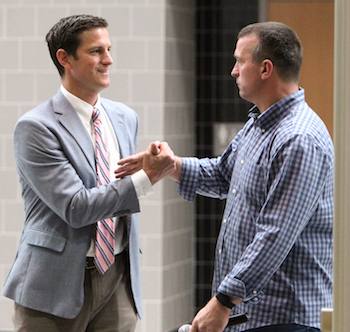
“Chris talked about making that promise and keeping it,” DiPisa said. “He used the word – why?
“I think that’s a question we ask ourselves every single day when we do almost anything. To be able to really process and know why you do something is really a powerful thing.”
Herren said that ‘Why?’ is the first question he would ask his children if they came home intoxicated.
“If my kid comes home in that condition, I’m not going to point the finger, I’m not going to blame, I’m not going to focus on their friends,” he said. “I don’t care where, with who, how much.
“I’m going to walk in there, I’m going to hug them and tell them how much I love them, and I’m going to ask them why. Why does my son - who from the outside looks so healthy and well - have to get drunk or do drugs on a Friday night to hang out with kids he’s known since he was five. ‘Why don’t you feel good enough to spend time with kids on a Friday night that you’ve known since you were five without it?’”
It’s a message, according to O’Hara, that everyone needed to hear.
“I think from his whole presentation what got to me the most was hearing him say things like, ‘Are you actually living how your grandma thinks you are?’” she said. “Asking us if we were proud of who we were becoming and if we’d want someone like a little cousin or a little sibling looking up to us to make the same decisions.
“I think that was just super important, just giving a second choice to every decision and every action we make and just being a smart and responsible person. I’m a senior going on to college - you never know what’s going to happen, and you have to be smart and responsible about things. I think he just brought that to light even more. The whole thing impacted everyone, and they’ll take it with them for a long time.”
Herren’s message – though different than expected - was one that will not soon be forgotten.
“I have seen Chris Herren speak on multiple occasions,” Stanton said. “His message was extremely powerful and different than my past experiences. Chris' delivery and approach were absolutely incredible. In speaking with many of our students, it is clear that this event had an amazing impact on our student body.”
A student outreach e-mail – which goes directly to Herren’s staff and social workers – is thp@theherrenproject.org.
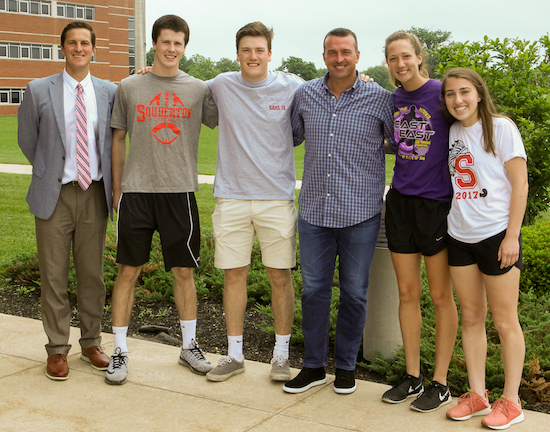
- Log in to post comments

